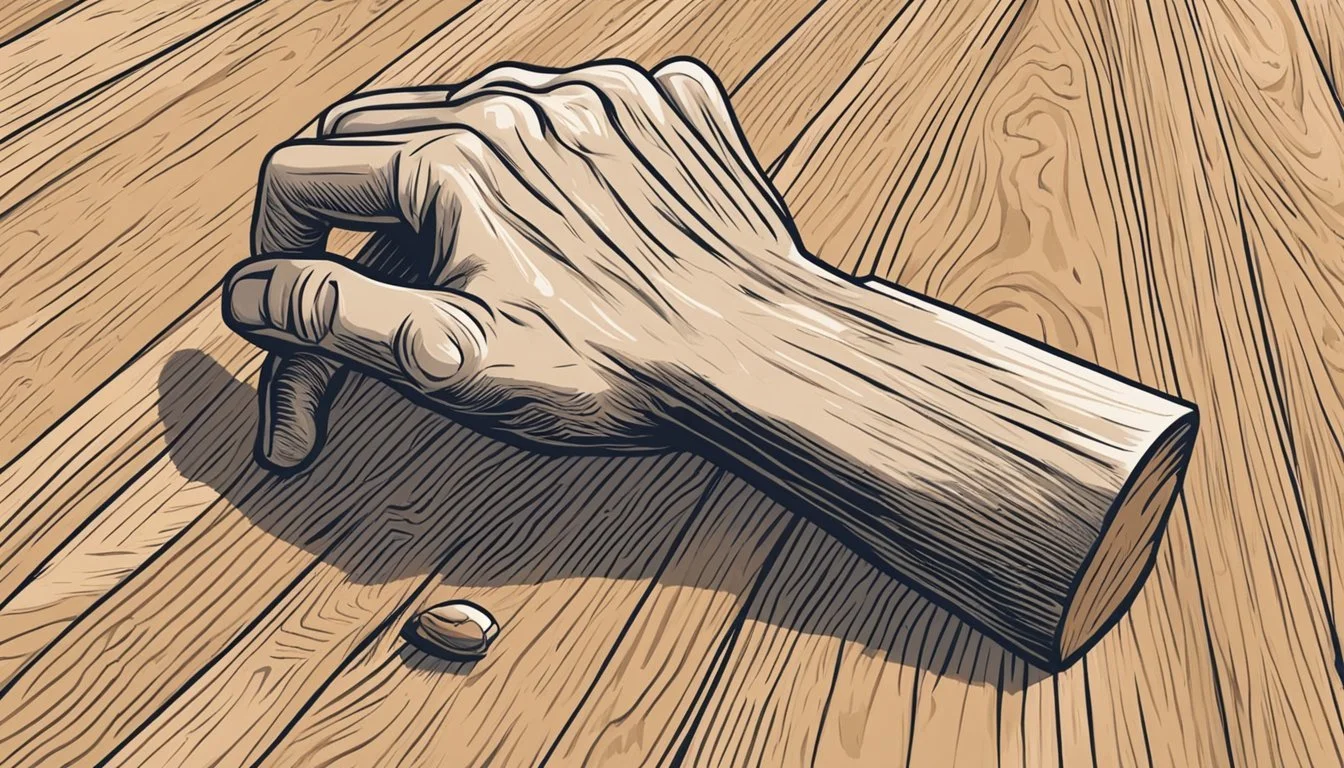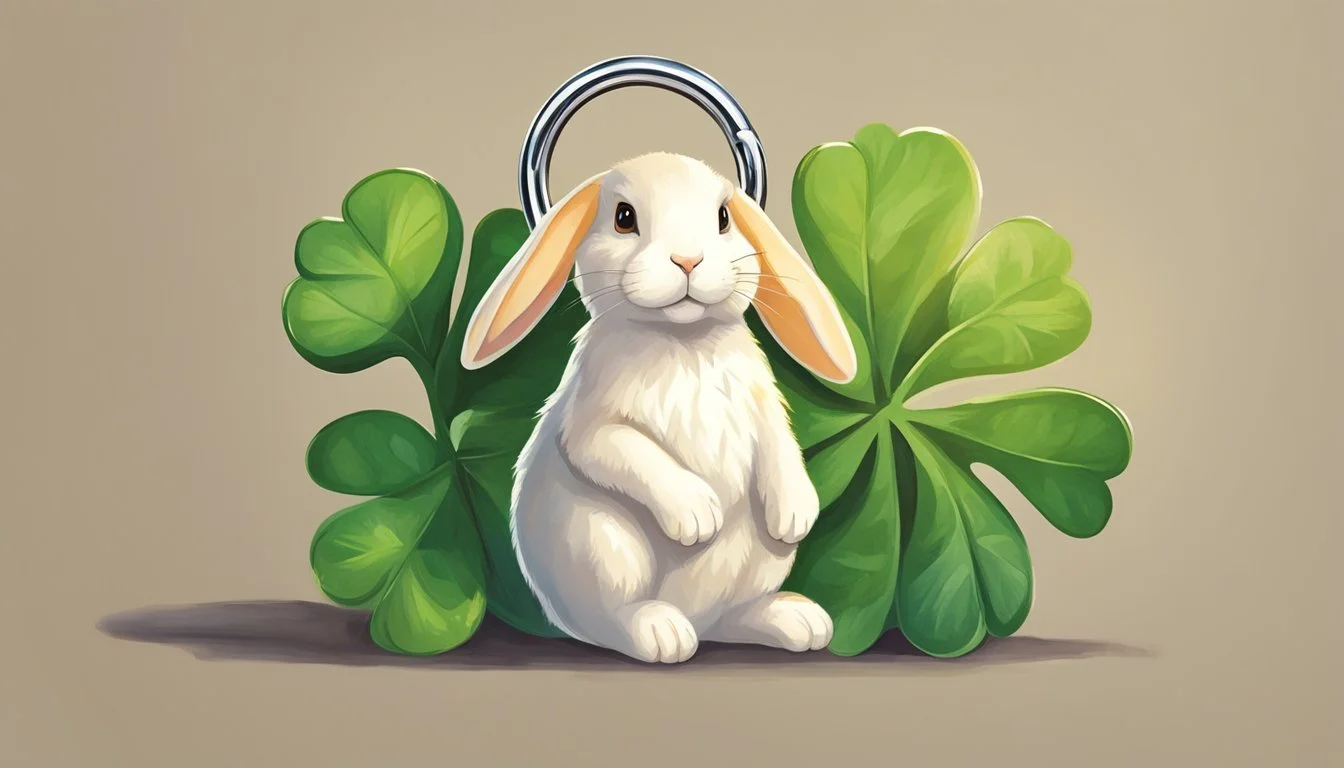13 Common Superstitions Held by Narcissists
Insights into Their Beliefs
Superstitions often reveal the underlying beliefs and anxieties of individuals, and those with narcissistic tendencies are no exception. Exploring the superstitions held by narcissists can offer valuable insights into how their unique worldview shapes their behaviors and interactions.
Why do narcissists cling to certain superstitions? These beliefs can provide them with a sense of control and superiority, reinforcing their egos. Understanding these superstitions helps in comprehending the broader patterns of narcissistic behavior, making it easier to navigate relationships with such individuals.
1) Breaking mirrors brings bad luck
The belief that breaking a mirror brings bad luck is ancient, dating back between 2,000 and 2,700 years.
In ancient Greece and the Roman Empire, reflected images were thought to have mysterious powers. People believed that a mirror's reflection held a part of one's soul. When a mirror broke, it was considered that a piece of the soul was corrupted or damaged, leading to misfortune.
Over time, this superstition spread across cultures and became ingrained in many societies. Some believe that the seven-year bad luck period originates from the Romans, who thought that life renewed itself every seven years.
Though modern science dismisses these claims, the superstition persists. Some people still take specific actions to counteract the bad luck of a broken mirror, such as burying the pieces in the moonlight or throwing them into a running stream.
Narcissists may be particularly influenced by this superstition. Given their heightened focus on self-image, the fear of a broken reflection could be especially distressing. The idea of it bringing bad luck only adds to their anxiety about maintaining an ideal self-presentation.
2) Finding a four-leaf clover brings good luck
The belief that finding a four-leaf clover brings good luck is deeply rooted in Western folklore. Each leaf of the rare clover is said to symbolize hope, faith, love, and luck. This superstition suggests that possessing such a clover can attract good fortune and positive outcomes.
Narcissists, with their heightened self-focus, might be particularly drawn to this belief. They may carry a four-leaf clover in their wallet or purse, hoping it will enhance their luck in personal and professional endeavors.
The rarity of four-leaf clovers adds to their allure. Because they are hard to find, the effort invested in locating one is often seen as a precursor to the luck it brings.
In addition, some narcissists might use the four-leaf clover as a charm for protection. They believe it shields them from negative influences and misfortune, thus reinforcing their sense of invincibility.
3) Friday the 13th is Unlucky
Friday the 13th is commonly perceived as an unlucky day, rooted in Western superstition. This belief has permeated various aspects of culture and society. Notably, the day combines Friday, considered unlucky in some cultures, and the number 13, often seen as ominous.
The superstition has even influenced the economy, as some people avoid making significant decisions or travel plans on this date. Businesses may experience reduced activity due to these beliefs. According to National Geographic, in Spain, the unlucky day is Tuesday the 13th instead of Friday.
The fear of this date is also heightened by popular media. The Friday the 13th horror film series, featuring the hockey-masked killer Jason Voorhees, capitalized on this superstition, instilling further fear and intrigue.
Historical events have also contributed to the superstition. For example, the mass arrest of the Knights Templar on Friday, October 13, 1307, is often cited as a reason why this day is considered unlucky.
A 2019 survey by YouGov showed that 18% of Americans find Friday the 13th unlucky, while 12% remain uncertain about this belief. The widespread nature of this superstition demonstrates its deep-rooted presence in Western culture.
4) A black cat crossing your path brings bad luck
In many cultures, encountering a black cat crossing one's path is considered an ominous sign.
This superstition has deep historical roots. In Medieval Europe, black cats were often associated with witches and evil spirits.
Narcissists may be particularly susceptible to this belief, interpreting such events as negative omens directed at them personally.
In North America, the notion of bad luck from a black cat is deeply ingrained. People may go out of their way to avoid black cats on the street.
In contrast, in places like Britain and Ireland, black cats are seen differently. A black cat crossing your path is believed to bring good luck, symbolizing fortune and prosperity. This contrast showcases how cultural perceptions can vary dramatically.
Despite these differing views, the superstition remains widespread. Narcissists, who often feel the world revolves around them, may place significant weight on these encounters.
This belief can drive their behaviors and decisions, reinforcing their sense of control over fate. It underscores the power of superstitions in shaping thoughts and actions.
5) Knocking on wood prevents bad luck
Knocking on wood is a widely held superstition. Many people believe that tapping on wood can prevent bad luck or misfortune. This superstition is common in various cultures and is thought to have ancient origins.
Christians associated this ritual with the wood of the cross, thus seeking divine protection. Over time, it spread and became part of popular culture.
In Britain, the phrase "touch wood" is commonly used, but it holds the same meaning. This act aims to avoid "tempting fate" after making a positive statement or prediction.
The practice was solidified in the mid-19th century. A mention in the magazine "Notes and Queries" in 1850 helped popularize it. It's an interesting mix of historical and cultural influences.
In the modern day, knocking on wood remains a simple, reflexive act. It’s a way to invoke good fortune quickly and easily.
Despite its widespread acceptance, the superstition has no scientific basis. Yet, it persists due to its deep-rooted presence in human culture and tradition. Many still find comfort in knocking on wood.
6) Walking under a ladder is bad luck
The belief that walking under a ladder brings bad luck has roots in several cultural and religious traditions. Many Christians view the triangle formed by a ladder leaning against a wall as symbolic of the Holy Trinity. Passing through this triangle is seen as breaking this sacred symbol and inviting misfortune.
Walking under a ladder is also associated with practical concerns. There is a risk of objects falling from the ladder or the ladder itself collapsing. This practical danger may have contributed to the superstition's persistence over time.
In addition to religious and practical explanations, some connections to witchcraft exist. For centuries, ladders have been linked to bad omens and magical practices. This lore has appeared in various films and television shows, reinforcing the idea that walking under a ladder is an invitation to bad luck.
Various remedies have been suggested to counteract this bad luck. Some believe making a wish while passing under the ladder or forming a specific hand gesture can negate the misfortune. These practices highlight the widespread and enduring nature of this superstition.
7) Spilling salt brings bad luck
Spilling salt is a well-known superstition often associated with bad luck. This belief can be traced back to ancient civilizations where salt was a valuable commodity. It was considered a symbol of purity and preservation, so wasting it was linked to inviting misfortune.
According to legend, the devil sits behind your left shoulder, waiting for a chance to cause trouble. Spilling salt supposedly provides him with that opportunity. As a remedy, people toss a pinch of salt over their left shoulder to ward off evil spirits.
In many cultures, this practice has persisted into modern times. For instance, in Russia, it is believed that spilling salt may indicate a coming argument or bad luck. This superstition remains deeply rooted despite being centuries old.
Some also believe that spilling salt can lead to financial troubles. They think that by spilling salt, they might inadvertently invite economic hardship. To counteract this, individuals often use rituals to reverse the bad omen, ensuring they do not face financial strain.
Further, religious influences have also shaped this superstition. In Christianity, salt represents longevity and durability, and spilling it could be interpreted as a sign of disrespect. Therefore, the simple act of spilling salt carries significant weight in various traditions and beliefs.
For more information on this superstition, visit HowStuffWorks on bad luck or check out Salt Superstitions to explore the topic in greater detail.
8) Opening an umbrella indoors is unlucky
The superstition that opening an umbrella indoors brings bad luck has roots in both practical and historical contexts.
Early umbrella designs from the Victorian era posed risks when opened indoors, often leading to accidents and damage in tight spaces.
In ancient Egypt, umbrellas were symbols of the sun god Ra, and opening one indoors was considered disrespectful.
This superstition persists today, partly due to the practical concerns of opening a fully extended object in confined areas. In modern settings, many continue to believe that doing so may disrupt harmony and bring misfortune.
Cultural beliefs and traditional warnings have kept the superstition alive. The idea that this action brings bad luck has been passed down through generations, instilling a sense of caution.
In addition to historical and cultural reasons, psychological factors also play a role. Superstitions offer a sense of control in unpredictable situations, which can be comforting for some.
Superstitions, like the one about opening an umbrella indoors, serve as reminders of societal norms and collective wisdom. They reflect the blend of historical anecdotes and cultural traditions that shape everyday behavior.
Understanding these origins helps explain why this age-old belief continues to be observed in contemporary times.
For a deeper look into why opening umbrellas indoors is considered bad luck, visit Wonderopolis.
9) A horseshoe over the door brings good luck
Hanging a horseshoe over the door is a well-known superstition believed to bring good luck and ward off evil spirits. This practice dates back to ancient times and is prevalent in many cultures.
The common belief is that the horseshoe should be hung with the ends pointing upwards. This creates a "U" shape, which is thought to capture and hold good luck.
Some variations of the superstition exist. For instance, some people believe hanging the horseshoe with the ends pointing downwards allows the good luck to flow out and bless those who pass beneath it.
The horseshoe's association with good fortune is partly due to its connection with protective symbolism. In various cultures, the shape of the horseshoe resembles the crescent moon, a symbol of fertility and prosperity.
Additionally, the iron used in horseshoes is believed to have protective properties against evil spirits and bad luck. Placing a horseshoe over the door is thought to harness these protective qualities, creating a safe and auspicious environment for the household.
These beliefs continue to thrive in modern times. Whether it's due to tradition, superstition, or personal belief, many people still hang horseshoes above their doors for good luck and protection. You can read more about the spiritual meaning of the horseshoe.
10) Carrying a rabbit's foot brings good luck
Carrying a rabbit's foot has long been considered a symbol of good luck. This belief can be traced back to ancient Roman times when it was believed to cure ailments like gout. Over time, the rabbit's foot became associated with protection against evil and bad luck.
In various cultures, including European and African, a rabbit's foot is used as an amulet. In the United States, this superstition was popularized by folk tales and old postcards depicting lucky objects.
Certain details can enhance the foot's luckiness. For example, the rabbit must have specific attributes, making its foot more potent as a talisman. Some believe it must be from a rabbit captured in a cemetery or killed by a cross-eyed person.
FDR, the 32nd President of the United States, was known to carry a rabbit's foot for good luck. Other notable figures, like Sarah Jessica Parker, still practice this superstition today.
Exploring different interpretations reveals a multitude of reasons people believe in the rabbit's foot's luck-bringing abilities. The common thread remains its deep-rooted association with bringing fortune and warding off misfortune.
11) The number 7 is lucky
The number 7 has long been considered a lucky number by many cultures worldwide. Its reputation for luck can be traced back to various historical and mystical beliefs.
In numerology, 7 is often associated with introspection, spirituality, and wisdom. This number also appears frequently in religious texts, such as the seven days of creation in the Bible.
People often observe the recurrence of 7 in natural phenomena. For example, there are seven colors in the rainbow and seven notes in a musical scale. These associations reinforce the idea of completeness and harmony linked to the number.
Casino games frequently highlight 7 as a lucky number. Slot machines and dice games often use 7 as a symbol of good fortune. This connection has further cemented its status in popular culture.
Modern superstitions continue to embrace the luck of 7. Individuals might choose a phone number, license plate, or home address containing this number, hoping to attract positive energy.
Moreover, certain traditions uphold the significance of 7 in rituals and celebrations. Some people ensure that events like weddings or important business deals incorporate the number to ensure success and happiness.
For those with narcissistic tendencies, the belief in the luck of 7 can be particularly compelling. They may feel that aligning themselves with this number enhances their sense of superiority and control over their destiny. This perception often leads them to place significant importance on the presence of 7 in various aspects of their lives.
To learn more about the cultural and historical context of lucky numbers, you can read this detailed article on 13 Superstitions About Lucky Numbers and Unlucky Numbers.
12) Birds flying into the house are omens
In many cultures, birds flying into a house are considered significant omens. Some view it as a sign of abundance and prosperity, believing the bird brings luck, wealth, and success to the household. This belief is rooted in ancient traditions where birds were seen as messengers from the spiritual realm.
Others interpret this occurrence as a sign of spiritual presence. Birds are thought to be highly sensitive to energy shifts, so their entrance into a home may suggest the presence of a protective or harmful spirit. This duality in interpretation showcases how deeply ingrained and varied superstitions can be regarding birds.
In some traditions, a bird flying into a house might signal impending change or unexpected opportunities. This reflects the idea that birds symbolize freedom and communication, often bringing messages that demand attention. For many, this serves as a reminder to be open to new possibilities and listen to their intuition.
Cultural differences also play a role in this superstition. For example, while some view the event positively, others might see it as a warning or bad omen. These varying perspectives illustrate how superstitions can be deeply personal and influenced by one's cultural background.
For more information on these beliefs, visit Bird In House Omens or When a Bird Flies Into Your House.
13) Dreaming of snakes means enemies are near
Many people see dreaming of snakes as an omen of hidden enemies. This belief is rooted in the snake’s historical symbolization of deceit and treachery. People have long associated snakes with betrayal and danger due to their venomous nature.
In dreams, snakes can represent someone in the dreamer’s life who is not trustworthy. This interpretation suggests that snakes are warnings about real-world threats or deceitful individuals. Seeing a snake in one's dream might indicate that an adversary is lurking nearby, ready to strike.
Some believe that the specific actions of the snake in the dream can provide further insight. For instance, a snake attacking could point to direct confrontation with an enemy. Meanwhile, a snake merely present in the dream could signify a hidden threat that needs uncovering.
Various dream experts share the view that snakes represent unpredictable or untamed aspects of life. This perspective is tied to the idea of enemies lying in wait according to findings.
Ultimately, the presence of a snake in dreams serves as a cautionary symbol. It prompts individuals to be more vigilant and discerning about the people around them.
Understanding Narcissism
Narcissism involves an exaggerated sense of self-importance and a lack of empathy for others. It often requires ongoing external validation to maintain self-esteem.
Defining Narcissistic Personality Disorder
Narcissistic Personality Disorder (NPD) is a psychological condition characterized by a long-term pattern of abnormal behavior. Individuals with NPD typically exhibit grandiosity, a need for excessive admiration, and an inability to empathize with others. This disorder can lead to significant challenges in relationships and daily functioning.
The Diagnostic and Statistical Manual of Mental Disorders (DSM-5) outlines specific criteria for diagnosing NPD. These include a pervasive pattern of grandiosity, fantasies of unlimited success, and a belief that they are special and unique. Clinicians also look for behaviors such as arrogance and exploitation of others.
Traits and Behaviors of Narcissists
Narcissists display several common traits and behaviors. They often seek constant admiration and validation from others. This need stems from a fragile self-esteem that relies heavily on external approval.
Common behaviors include manipulation, lack of empathy, and an inflated sense of superiority. Narcissists may also exhibit aggressive reactions when faced with criticism. They prioritize personal success and status, frequently viewing relationships as transactional.
Narcissistic traits can significantly impact interpersonal relationships, making it challenging to form genuine connections. In many cases, the emphasis on self-centered behaviors leads to a cycle of conflict and dissatisfaction with others.
Psychological Impact of Superstitions on Narcissists
Superstitions can significantly influence the psychological well-being of narcissists, affecting their thinking patterns and perceptions of control. These influences can be seen through cognitive biases and their desire for control and perceived omnipotence.
Cognitive Biases and Magical Thinking
Narcissists often exhibit cognitive biases that reinforce their superstitious beliefs. They may engage in magical thinking, attributing cause and effect relationships to unrelated events. This can stem from a need to feel special or unique. Kahneman and Tversky's work on loss aversion highlights how a greater fear of losing can drive these biases.
This type of thinking can provide a false sense of having control over outer conditions. It is not uncommon for a narcissist to believe that certain rituals or charms can ward off bad luck or bring success. Such behaviors can become deeply ingrained and impact their decision-making processes, often leading to irrational actions.
Control and Perceived Omnipotence
A defining characteristic of narcissism is the need for control and a sense of omnipotence. Superstitions can serve as a way for narcissists to assert control over unpredictable situations. In high-stakes environments such as sports or business, they might rely on superstitious rituals to manage anxiety and stress.
This perceived control can bolster their self-esteem and reinforce their sense of superiority. The belief that they can influence outcomes through superstitions aligns with their grandiose self-view. Despite the lack of scientific basis, these practices provide narcissists with comfort and a misplaced sense of power, ultimately feeding their need for control and dominance.
Cultural and Historical Context of Superstitions
Superstitions have deep roots in cultural and historical contexts, shaping beliefs and behaviors across different societies. They often stem from a need to explain the unknown and mitigate fear.
Origins and Evolution of Common Superstitions
Many superstitions have origins in ancient civilizations, where they served to explain natural phenomena or offer protection. For example, the number 13 is associated with misfortune due to its roots in Christianity, notably because Judas, the betrayer of Jesus, was the 13th guest at the Last Supper.
Superstitions evolve over time, influenced by changing societal norms and scientific understanding. While some superstitions have faded, others remain entrenched due to their adaptability and integration into cultural rituals and literature.
Superstitions in Different Societies
Different societies have unique superstitions influenced by their cultural and historical contexts. In Western cultures, Friday the 13th is considered unlucky, a belief influenced by biblical events. In contrast, some Eastern cultures consider the number 4 unlucky because it sounds like the word "death" in several Asian languages.
Superstitions also manifest in daily practices and traditions. For instance, in many cultures, breaking a mirror is believed to bring seven years of bad luck, originating from ancient beliefs about mirrors reflecting the soul. These beliefs highlight the diverse ways societies use superstitions to navigate life's uncertainties and express their cultural identity.














